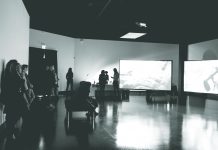Since mid-April, thousands of university students across the globe have been protesting in solidarity with Gaza, taking inspiration from students at Columbia University in the U.S. From Sydney, Australia to Dublin, Ireland, and now Waterloo, Canada, students have set up encampments on their university campuses, all with the goal of appealing to school administrators. They are asking their respective universities to disclose, divest, and boycott companies that are directly involved in fueling the war, entities they describe as “complicit in the Gaza genocide.”
Like many students, I was surprised when I showed up to campus last Monday, May 13, and discovered an encampment set up on the Grad House Green. I had read about the encampments set up at other schools like Columbia and McGill University, and was also aware of the brutality that occurred at the University of Calgary, where law enforcement used riot gear to break up the encampment.
As the response to the encampments has been contentious, with reactions varying from praise to shame, I decided to check out the UW encampment last Thursday, May 16. The @occupyuwaterloo Instagram page provides a daily schedule and updates students on relevant encampment information, such as informing students that the university has installed surveillance cameras on top of the Dana Porter Library and the Tatham Centre overlooking the encampment.
Last Thursday’s schedule included a collage session at 11:30 a.m., which I caught the tail end of when I arrived at around 1:30 p.m. The session involved participants creating poster collages out of magazine clippings that would then be posted along the perimeter of the fence. I was immediately welcomed and put to work, cutting out red poster boards and gluing things down. It was a relatively hot day in an area directly under the sun, and while I experienced a little discomfort, the overall sentiment from the protesters was that this discomfort was nothing compared to the realities of those in Gaza.
Lunch arrived soon after, with fresh meals donated for students to enjoy. At around 2:30 p.m., Kamil Ahmed from Community Justice Initiatives led a workshop on de-escalation and conflict resolution. The main skill highlighted was to not engage with any individual from outside the encampment that was trying to be argumentative, as the camp is a peaceful environment and prioritizes safety. We sat in a circle and discussed what the purpose of the protest was, and what we could do to ensure it remained peaceful.
That took us until 4 p.m., where we were led in a reading and discussion of Chapter 1 of Frantz Fanon’s The Wretched of the Earth. The chapter “On Violence” explores the relation between colonists and the colonised and the need for violence in the movement of decolonization. Organisers passed out physical copies of the text, so that those unfamiliar were able to read along.
By this point in the day, the crowd had grown — there were at least 30 people there all engrossed in the reading and discussion. So engrossed that by the end of the session (which lasted about an hour and a half) we had only covered three pages. The discussion was lively and educational, but I was most impressed by how this discussion had captivated students, including myself, to the point where we would rather stay at the encampment opposed to doing something else taking advantage of the weather when the day was so beautiful.
Before I left, I was ushered to get more food as dinner had just arrived. Everyone was still so stimulated by the discussion that most participants carried on, heading towards the makeshift library that included more material on the matter. I finished the day chatting to campers, realizing that this space was incredibly unique. People from various backgrounds have all been united by this human cause because they see the atrocities that have taken place in Gaza, and have decided simply doing nothing is helpful to no one.
Since my visit, UW released a statement sharing that “the encampment cannot remain indefinitely [as] it is already in breach of several of [their] prohibited activities.” Furthermore, just last night, the university served the encampment with a formal notice to end the encampment and remove all structures.
While some may say the encampments are a waste of time, some Canadian universities have agreed to divestments, including Ontario Tech University. Additionally, more than 320 faculty members from UW and Wilfrid Laurier University signed an open letter in support of the encampment.




























